The philosopher Philip Goff has just had a book published called Why? The Purpose of the Universe. According to the writer Philip Pullman, this book is “going to explain the purpose of the universe”. More relevantly, some reviewers have made a point of telling us that Goff’s philosophical speculations have nothing to do with religion. This essay argues that they have almost everything to do with religion. What’s more, Goff’s new cosmic religion is designed to express his prior political views and values.
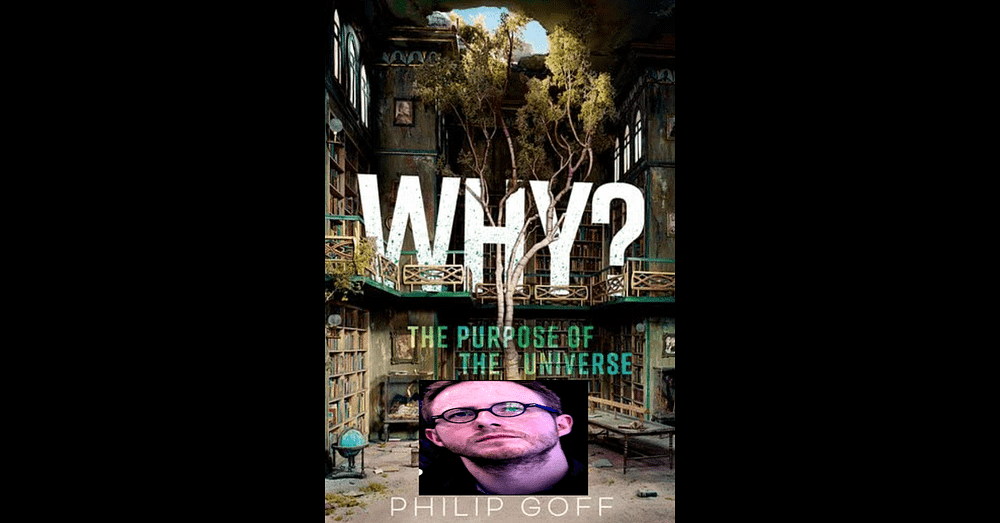
[This essay isn’t going to tackle the technical details of the new speculations about “cosmic purpose” and suchlike. See the linked essays at the end of this piece for more detailed discussions on these subjects.]
In a review of Why? The Purpose of the Universe, the writer Philip Pullman claims that Philip Goff believes that his book is “going to explain the purpose of the universe”. It can be presumed that Goff himself would deny that his new book is so highfalutin. Perhaps, instead, Goff would say that it simply describes and analyses the various options on offer when it comes to explaining the purpose of the universe…
But who knows?
In any case, Pullman finds Goff’s “cosmic chutzpah” appealing. Indeed, it “predisposed [him] in its favour before [he] even began to read the text”!
In a similar vein, rather than the Universe itself having a purpose, the professor of philosophy Josh Rasmussen actually states that Goff’s own book
“contributes to the purpose of the universe in a profound and beautiful way”.
Let’s return to Philip Pullman.
It’s worth noting here that Pullman also buys into the political and ethical underpinnings of Goff’s new speculative philosophies. Or, at the least, Pullman tells us that Goff’s new book will help us
“regain that sense of connectedness that’s so important not just to our well-being, but to our very survival”.
To add more academic backing to Goff’s speculations. The British philosopher Michael Tye believes that Goff’s book will (or simply may?) offer an answer to those of us who’ve “ever wondered what the point is in living”.

… So it is these religious, political and ethical underpinnings of Goff’s philosophies (explicitly referred to by Michael Tye, Philip Pullman and Josh Rasmussen) which will be discussed in this essay. [See note 1 on Goff’s many academic fans.]
Finally, what also needs to be noted in this introduction is that Goff extensively refers to both science and philosophy in his new book.
Yet he’s doing nothing new here.
In fact, many of the followers of traditional religions did exactly the same thing, and they did so for many centuries before Goff was even born.
This means that Goff is simply making his own contribution to this long religious tradition.
The Politics of Philip Goff’s Cosmic Religion
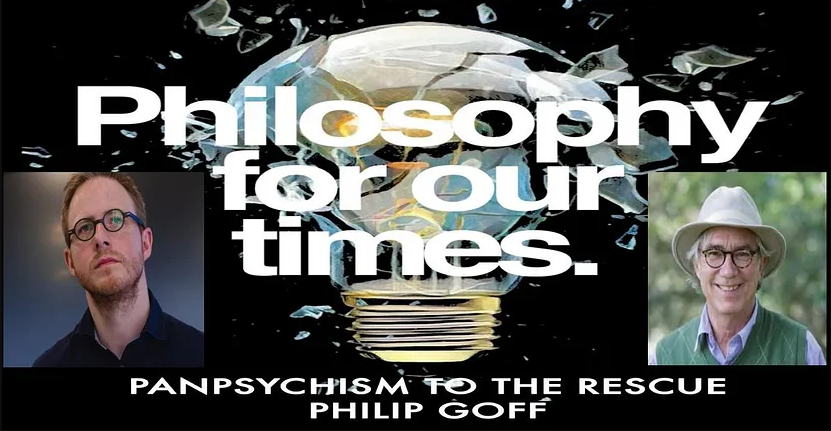
At least in one introduction, Goff seems to simply assume that there is such a thing as a “cosmic purpose without God”, and only then does he “explore a variety of hypothesis” to explain it.
Which “variety of hypothesis” is that? This variety:
“[A] non-standard designer (e.g., a bad designer, a limited designer, or maybe just an ordinary person in the next universe up), teleological laws (laws of nature with purposes built into them), or cosmopsychism (the view that the universe itself is conscious).”
When it comes to Goff’s belief (or his entire belief system) in a “cosmic purpose”, he believes that it must “involv[e] political engagement”.
Indeed, Goff often admits that there are political and ethical motivations and beliefs hiding (or sometimes not actually hiding) underneath the philosophical positions which he does take.
For example, Goff states that
“living in hope of cosmic purpose is a deeply meaningful way of engaging with the world”.
In other words, Goff is stating (if perhaps implicitly) that believing in a cosmic purpose helps us (both politically and ethically) engage with the world. More specifically, Goff argues that a belief in a cosmic purpose helps us (as individuals and as societies) develop a superior political and moral attitude to the world.
Interestingly, the Belgium philosopher Helen De Cruz also believes that seemingly non-ethical philosophical theories should “provide an ethical guide”. Cruz then says that Goff’s book
“outlines an attractive picture of spiritual belonging and practice in a godless world []”.
So is Goff doing what so many poststructuralists, postmodern philosophers and Marxists have done when they placed Politics in the role of First Philosophy? (Such philosophers haven’t — as far as I know — put their own position in this simple way.)
Alternatively, is Goff doing what the French philosopher Emmanuel Levinas did when he placed Ethics in the role of First Philosophy? (Levinas actually put it this way himself. See here.)
Perhaps, instead, both Politics and Ethics together take on the role of First Philosophy in Goff’s philosophy.
Now it’s worth saying here that the very idea of keeping science and philosophy free of politics has been deemed to be naïve and unsophisticated by various Marxists, postmodern philosophers and poststructuralists. (A small number of Marxists don’t take the position that “all science and philosophy is inherently political”.) Consequently, in this Hobbesian world, all scientists — just like all academics — are always involved in a political (to use Antonio Gramsci's terms) “war of position”, as well as a battle for “hegemony”. [See note 2.]
Perhaps Philip Goff believes at least some of this too.
In any case, Goff himself has a fairly long history of admitting (if sometimes in roundabout ways) that politics and ethics are in the driving seat when it comes to at least some — perhaps many — of his philosophies.
Like the scientists and activists of Science for the People who believed that science should serve “radical politics”, or the countless academics who believe that their work should serve very particular political causes and goals, Goff believes that the philosophies he advances should also serve very particular political causes and goals.
This way of looking at science and philosophy has been taken to extreme levels.
For example, the Nazis in the 1930s and the Soviets from the 1920s to the 1950s explicitly and directly tied both science and philosophy to advancing, respectively, Nazi and communist goals and ideas. (Lysenkoism and racial science are just two obvious examples of this.) [See note 3.]
In terms of actual examples of the political and ethical underpinnings of Goff’s philosophies.
We have Goff’s “spiritual” and political takes on panpsychism itself, on the nature of plants, and now we have his political, ethical and religious take on cosmic purpose.
As an example of this, take Goff’s words in his book Galileo’s Error:
“For a child raised in a panpsychist worldview, hugging a conscious tree could be a natural and normal as stroking a cat.”
In the same book, Goff also wrote:
“My hope is that panpsychism can help humans once again to feel that they have a place in the universe. At home in the cosmos, we might begin to dream about — and perhaps make real — a better world.”
And one more passage:
“[I]t’s reasonable to suppose that children raised in a panpsychist culture would have a much closer relationship with nature and invest a great deal more value in its continued existence.”
As for plants, Goff wrote:
“[W]e now know that plants communicate, learn and remember. I can see no reason other than anthropic prejudice not to ascribe to them a conscious life of their own.”
And now for egalitarian plants:
“The mycorrhiza structures [between tree roots and fungi] allow for a complex system of egalitarian redistribution.”
So does all this mean that Goff’s politics and ethics are wagging the philosophical dog here?
Philip Goff’s Non-Traditional Religion
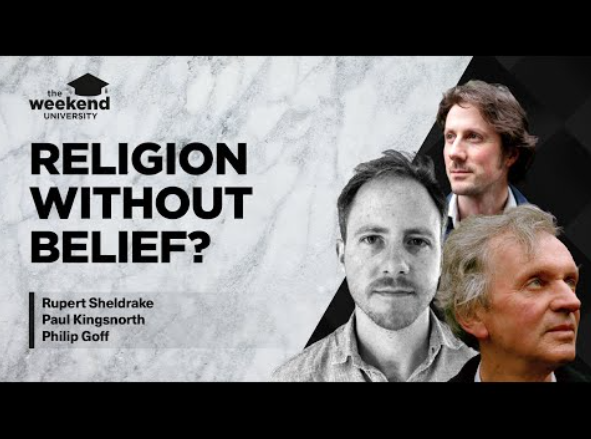
Some reviewers of Philip Goff’s new book make a point of saying that his philosophical speculations have nothing to do with religion. Or, at the very least, they make the point that Goff’s speculations have nothing to do with traditional religion.
For example, Geraint Lewis (Professor of Astrophysics at the University of Sydney) writes:
“In this new book, Goff explores purpose in the cosmos, not a purpose rooted in religion, but in a conscious fabric of the universe itself.”
This claim (i.e., Goff’s philosophical positions are not “rooted in religion”) will be rejected in this essay. Indeed, it seems obviously false.
It can easily be argued that Goff’s new philosophy is rooted in religion. What’s more, it can be argued that it’s even rooted in (as well as being a reaction to) traditional religion. However, to some readers it may seem otherwise (or it’s made to seem otherwise) simply because Goff is attempting to create a non-traditional religion — a new religion which he also believes is backed up by both science and philosophy.
None of that means that Goff has actually broken free of religion.
Far from it.
After all, a non-traditional religion (even one that refers to science and philosophy) is still a religion.
This is also a non-traditional religion which is perfectly in tune with Goff’s prior politics and ethics. That is, Goff’s new philosophical explorations reach political and ethical conclusions which just happen to perfectly square with what Goff believed well before such explorations. (Goff has provided enough biographical information — over the years — to substantiate this claim.)
Yet the notion of a cosmic purpose may seem like a strange thing to tie directly to politics. However, that’s exactly what Goff does.
Philip Goff and the Physicist Paul Davies
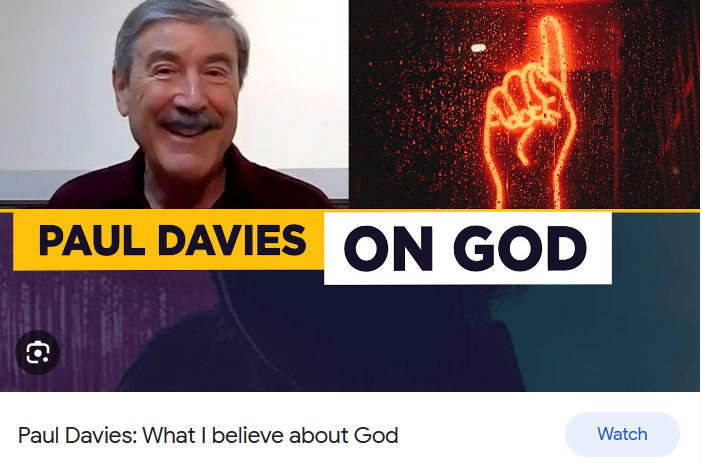
When I read Philip Goff’s own account of his new book, it, at times, seemed as if he was directly quoting the physicist and popular-science writer Paul Davies.
However, it’s not clear how extensively Goff has relied on the books of Davies, or even if he has done so at all. That said, it’s still the case that, at least at times, their mutual philosophical positions are almost identical. (One difference being that Davies’s positions — at least the relevant ones — date back to the 1980s. [See Davies’s God and the New Physics, published in 1983.])
Other commentators have noted these strong similarities too.
For example, Dr. Brandon Rickabaugh wrote the following:
“Goff is not the first to entertain this view. Paul Davies, for example, entertains the hypothesis that ‘the universe has engineered its own self-awareness through quantum backward causation or some other physical mechanism yet to be discovered.’ ‘In this way,’ says Davies, ‘the universe could both create itself and steer itself toward its destiny.’ Goff is, however, the first to develop a detailed defense of such a view.”
Well, Davies is a physicist. This means that he uses a different set of technical terms and modes of expression than those which Goff uses. This may also mean that Goff’s work on these issues isn’t really more (as Rickabaugh puts it) “detailed” than Davies’s own. Indeed, there isn’t really that much — technical — detail in Goff’s books. (There is technical detail in Goff’s academic papers.)
So to get back on track.
If Philip Goff isn’t clear (or perhaps honest) about his religious (as well as political) motivations, then Paul Davies certainly is. Or, at the very least, Davies has, at times, been upfront about all this.
For example, Davies once expressed his own position by using the American theoretical physicist John Archibald Wheeler as a proxy.
Firstly, Davies claims that Wheeler was
“not conventionally religious, but inspired by a reverence for nature and a deep sense that human beings are part of a grand scheme which we glimpse only incompletely”.
So surely it’s not unfair to say that Davies is also talking about himself here.
In any case, Davies finishes off with these words:
“So maybe that is a religious conviction of sorts.”
Elsewhere, Davies also talked in terms of his own “cosmic religious feeling”.
Davies and Goff and Their Non-Traditional Religion
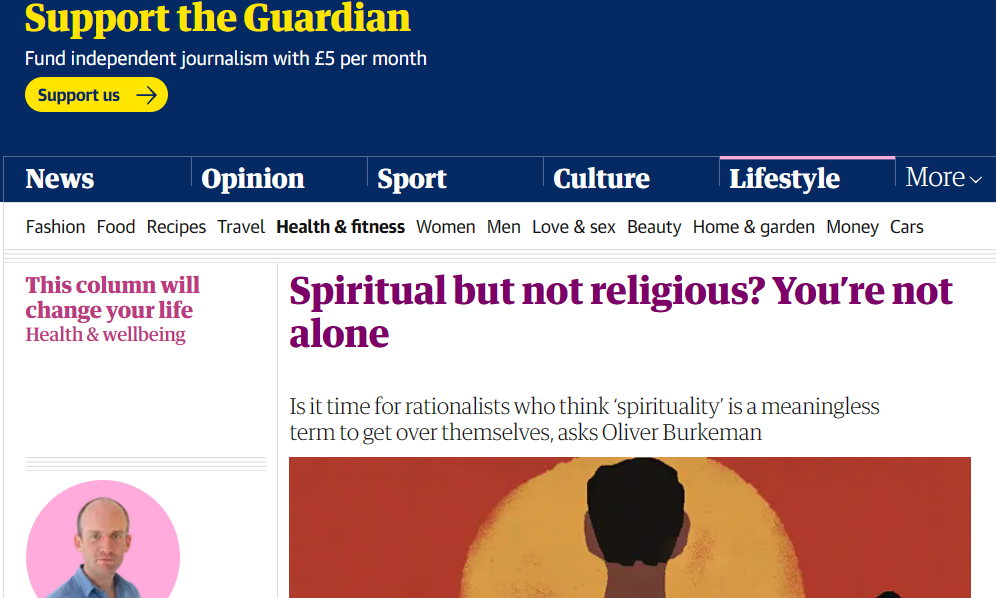
Philip Goff is at pains to say that his philosophies aren’t religious. Similarly, Paul Davies is at pains to say that his religion isn’t “conventional”.
Goff states his non-traditional views in the following:
“I don’t believe in the Omni-God (the all-knowing, all-powerful, and perfectly good, creator that Christians, Muslims and Jews believe in) because I don’t think a perfectly good being who could do anything would create a universe with so much suffering.”
Like many people since since the 1960s (and a small amount of people before that), Goff and others may believe that it’s just not acceptable anymore to believe in (as Paul Davies puts it) “conventional religion”. After all, in many people’s eyes — including in Goff’s eyes — traditional religion has a bad history. Indeed, to some people, traditional religion has an evil history.
More relevantly, Goff is completely in tune with Davies when it comes to believing in “a universe with a purpose”. Of course, that purpose isn’t (to use Goff’s words) “driven by an Omni-God”. It’s driven by… well, other things.
Paul Davies put his own teleological position in the following way:
“[T]he bio-friendliness of the universe arises from an overarching law or principle that constrains the universe/multiverse to evolve towards life and mind. It has the advantage of ‘taking life seriously’, treating it neither as a completely unexplained bonus [] nor as a mere passive selector [].”
He then continued:
“In short, it builds purpose into the workings of the cosmos at a fundamental (rather than an incidental) level, without positing an unexplained pre-existing purposive agent to inject purpose miraculously.”
[The technical details of this cosmic teleology aren’t going to be discussed in this essay. See links at the end of this essay.]
Goff sees traditional religion as being politically and ethically incorrect. In parallel, Goff’s new cosmic religion is deemed (by Goff himself) to be politically and ethically correct.
Goff expresses his position in the following way:
“Ultimately, I outline a way of living in hope that cosmic purpose is unfolding, involving political engagement and a non-literalist interpretation of traditional religion.”
The upshot here is that if one interprets traditional religion literally, then that will result in politically and ethically incorrect conclusions and beliefs. However, if one interprets traditional religion non-literally, then such interpretations — and traditional religion itself — can be shaped and fashioned into something that’s both politically and ethically correct.
Another way of putting this is to say that Goff’s new cosmic religion perfectly reflects what he takes to be the progressive (see here) values, causes, and beliefs of 2023.
Thus, this is the purest form of religious presentism one can imagine (i.e., in terms of Goff’s judgments about traditional religion).
Goff then gives more details about his non-traditional religion. (Except, of course, he’d argue that it isn’t any kind of religion at all.) He writes:
“Western thought has been dominated by the dichotomy of traditional religion and secular atheism. In Why? The Purpose of the Universe (Oxford University Press), I argue that it’s time to move on from both God and atheism.”
So is it time to “move on” to a non-traditional religion?
Is it time to move on to a religion which also abides by Goff’s own politics and ethics?
It certainly seems that way.
Again elsewhere, Goff distinguishes himself from traditional “religious thinkers” and their “traditional God”. He writes:
“In contrast to religious thinkers, I argue that the traditional God is a bad explanation of cosmic purpose. Instead, I explore a range of alternative possibilities for accounting for cosmic purpose, from the speculation that we live in a computer simulation to the hypothesis that the universe is itself a conscious mind.”
Goff is actually a religious thinker.
Sure, he also sees himself as a critic of traditional religion, and also as a critic of traditional religious thinkers.
So it can be said that Goff’s cosmic religion is very up-to-date. Yes, it’s fashionable and very 2023.
However, Goff believes that his non-traditional cosmic religion still needs the back up of both science and philosophy.
Thus, in the following passage Goff sells his own scientific credentials to his readers:
“Through an exploration of contemporary cosmology and cutting-edge philosophical research on the nature of consciousness, I argue for cosmic purpose: the idea that the universe is directed towards certain goals, such as the emergence of intelligent life.”
Well, at the least, Goff is informing people that he reads scientific literature.
Yet it must immediately be said here that traditional religion also needed the backup (or help) of both science and philosophy!
Or, at the very least, many theologians, philosophers and scientists in the past — and over many centuries — also believed that their own religions needed both scientific and philosophical backup (or help).
Thus, Philip Goff is doing nothing new when he extensively refers to both science and philosophy — while also advocating his new cosmic religion.
Finally, since politics, ethics and religion are in the driving seat here, we can expect no limit to Philip Goff’s future philosophical speculations.
Notes
(1) The abundance of positive reviews of Philip Goff’s new book (as featured in this essay) is partly — or even largely — down to a system of career networking that many academics — especially Goff himself — indulge in on Twitter/X, social media generally, and within the book-selling and seminar circuits. Indeed, I’ve personally seen it occur — many times — in practice. Another way to put that is to say that Goff — just like many other academics — has gone out of his way make many academic and career-related friends on social media, etc.
(2) Antonio Gramsci’s vision is a variation on Thomas Hobbes’s “the war of all against all” (i.e., Gramsci’s “war of position”). However, instead of individuals warring against individuals, we have social groups, political groups or identities warring against other social groups, political groups or identities.
(3) There’s a vast literature on this subject. See ‘Science and technology in Nazi Germany’, and ‘The Soviet Academy of Sciences and the Communist Party’.
Links: ‘Panpsychist Philip Goff’s Combination Problem: Little Conscious Subjects and Emergence’, ‘Intrinsic Nature: Philosopher Philip Goff on What Physics Leaves Out’, and ‘Professor Philip Goff’s (Panpsychist) Philosophy of Trees’.
On Paul Davies: ‘Physicist Paul Davies’s Deep — or Specious! — Questions About Life, the Universe and Everything’, ‘Isaac Newton’s Religious Physics?’, and ‘Physicist Paul Davies’s Contributions to the Advancement of Religion, As Seen By Father Mariano Artigas’.










No comments:
Post a Comment